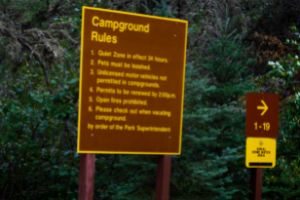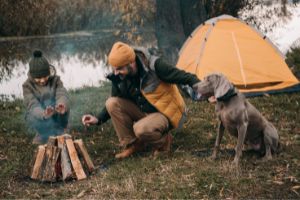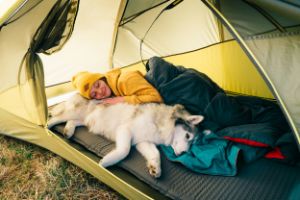Every pet owner wants to bring along their four-legged family member when they set out for a fun adventure, including camping. However, camping excursions must be carefully planned, from understanding campground rules to ensuring your pet is safe in an unfamiliar outdoor environment. June is National Camping Month—the perfect time to safely explore how to take your pet along for a multi-day camping trip.

Check the Rules For Camping With Pets
Many national, state, and local parks allow dogs, with them able to stay at campgrounds. However, there might be hiking trails that don’t permit dogs and other places you intend to visit that aren’t pet-friendly. Do your homework before booking a camping location to ensure your dog can accompany you everywhere, as you can’t leave them alone at your campsite.
Leaving your dog alone in an unfamiliar environment can cause severe anxiety even if crated. Not only will your dog be frightened when left alone in a new place, but the voices and noises from neighboring campers will also leave your dog anxious and barking most of the time. You also risk them running out of water during the hot summer months or encountering wildlife with no one there to help. Pre-plan your day-to-day activities, being sure to check websites or make phone calls to ensure your dog can come along. The National Park Service website tells you which parks allow pets and offers guidance on camping and hiking with pets.
Keep Pets Leashed
While all dog owners enjoy seeing their pets run free and enjoy the great outdoors, allowing your dog off-leash in an unfamiliar environment is risky. Many dangers come with allowing your dog to roam free, and almost all campgrounds require they remain on leashes to avoid issues with fellow campers.
Risks associated with unleashing your dog while camping include:
- Disrupting neighboring campers
- Frightening children who aren’t comfortable around dogs
- Getting lost if they wander too far
- Coming into contact with wildlife
- Being unaware of where they’ve eliminated, breaking the “clean up after your pet” rule
- Drinking from puddles or slow-moving water and potentially exposing them to Leptospirosis bacteria
- Risk of burns from campfires or ashes on the ground
- Risk of eating something they shouldn’t, like BBQ skewers or corn cobs

Pack Accordingly When Camping With Pets
Taking your pet along for a camping trip means extra provisions, not only for the campsite but also for your daily excursions. Be sure to pack more than enough food, as the additional activity means they’re burning more calories and might consume more. Fresh, bottled water is crucial to keep your pet hydrated and away from stagnant water in puddles.
Additional camping provisions for your pet include:
- Leash and harness
- Bedding
- Poop bags
- Canine first aid kit
- Towel
- Food and water bowls
- Vaccination record
- Collar with I.D. tags attached
Hopefully, you've already gotten your dog or cat microchipped but, if not, doing so before camping is always a good idea in case they were to get lost.

Safe Sleeping While Camping With Pets
When packing or buying a tent for your camping trip, consider your dog, especially if it’s a large breed. Your dog should sleep inside the tent with you and not be left outside to encounter skunks, bears, or coyotes during the night. With plenty of wildlife roaming outdoors, your dog will bark and attempt contact with anything that makes its way into your campsite. Bring cozy bedding for them, and keep them inside the tent with you, so they feel secure. Sleeping in the tent with you is also vital if cold weather is a factor, as body heat within the tent will keep them warm.
Camping with your pet can be a fun and rewarding family experience, but only when safety is a priority. Camping trips can be very negative experiences if you don’t consider their needs and safety measures, turning a fun family outing into a nightmare. Contact us to learn more about safely camping with your pet.
